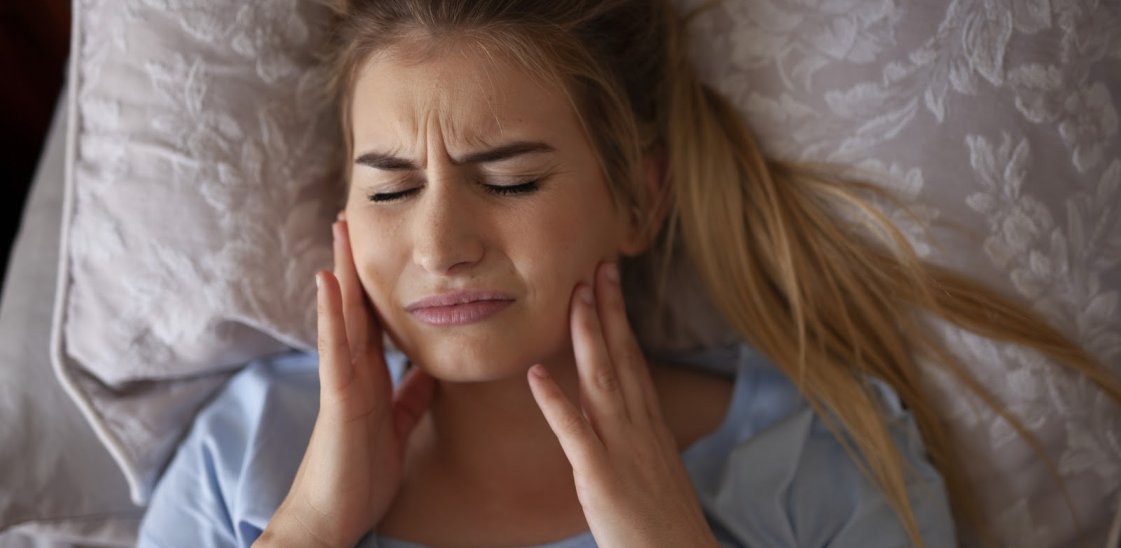
How to stop grinding your teeth
Teeth grinding, or bruxism, may not be a serious or life-threatening condition but it can cause lots of problems for your teeth and jaw if left untreated. The movement usually occurs at night (sleep bruxism), however you may also do it while you’re awake (awake bruxism), and it can result in tooth and jaw pain, headaches and chipped or worn-away teeth. This is why it’s so important to kick this habit as soon as you’re aware of it. However, this is often easier said than done. Below, you can find out what could be causing you to grind your teeth and how you can stop it.[1]
Why do people grind their teeth?
This condition is one of those where a cause is not entirely clear. According to the NHS, it’s thought that the most common cause of bruxism is stress or anxiety. When you’re stressed or anxious, the condition is more likely to get worse and during times of calm, it might even go away altogether.
During the COVID-19 pandemic, dentists saw an increase in the number of patients coming to them complaining of bruxism. It’s thought that the increased stress and anxiety due to not seeing family members or being worried about the virus caused more people than ever to be affected by teeth grinding and jaw clenching, whether awake or asleep. It’s also thought that working from home could make the condition worse. Physiotherapist Krina Panchal states that our backs, necks and jaws are all connected and so bad posture could actually increase your risk of bruxism. With this in mind then, it’s not surprising that teeth grinding has increased in the UK population with more people now working from dining tables and sofas instead of office desks.
Those also at a higher risk of teeth grinding include children, smokers, those on certain medications and those with sleep disorders, such as sleep apnoea. When it comes to medication, certain Selective Serotonin Reuptake Inhibitors (SSRIs) can be the root cause. Put simply, these are antidepressants and examples include sertraline and fluoxetine. If you’re on one of these types of medication and are worried about bruxism, you should seek medical advice from your doctor.
If you have some kind of sleep disorder, such as sleep apnoea, then you’re also more likely to grind your teeth. It’s unclear why this is, but cases of bruxism are higher in those with these kinds of conditions. But this condition doesn’t just affect people with sleep disorders, but those who struggle to sleep or are more active in their sleep, too. Those who snore, talk in their sleep, sleepwalk or experience sleep paralysis could be more likely to grind their teeth. Finally, certain lifestyle changes may be the cause, such as drinking lots of alcohol, smoking or drinking caffeine.[1]
How to stop grinding your teeth at night
If you’re aware that you’re grinding your teeth at night, the first step is to visit a dentist to determine how bad the problem is and what damage it may have caused. They will likely recommend a dental guard as the first port of call for treatment. In severe cases of bruxism, teeth can become worn down and chipped, gums bleed more than normal and teeth may even fall out altogether. A guard will instantly protect your teeth and are a good temporary measure while you try to figure out how to stop grinding your teeth altogether.
In order to do this, you must try to find the cause. Have a think about what you eat and drink in a day or what kinds of medication you’re on that could be making the problem worse. If you drink alcohol every day, you could try to cut this down to a couple of times a week, for example. If you believe medication to be the issue, you should arrange an appointment with your doctor to discuss this. You should never stop taking medication without your doctor’s permission.
As stress and anxiety seems to be the most common cause, you should look into how to alleviate these feelings. You might benefit from mindfulness, for example. This is a form of meditation that many people use when they’re feeling particularly anxious. A short mindfulness session before you go to bed could help the problem. You should also try to be aware of your movements during the day. Try to focus on your mouth and teeth every now and then, and try to relax the area. If you notice that you’re clenching or grinding your teeth during the day, you can train yourself to stop this by forcing your jaw to relax. To do this, place the tip of your tongue between your front teeth.
Teeth grinding can be an uncomfortable and even painful condition, but luckily, you don’t have to suffer the consequences forever.[1]
Resources:




